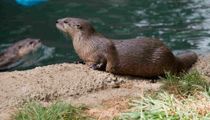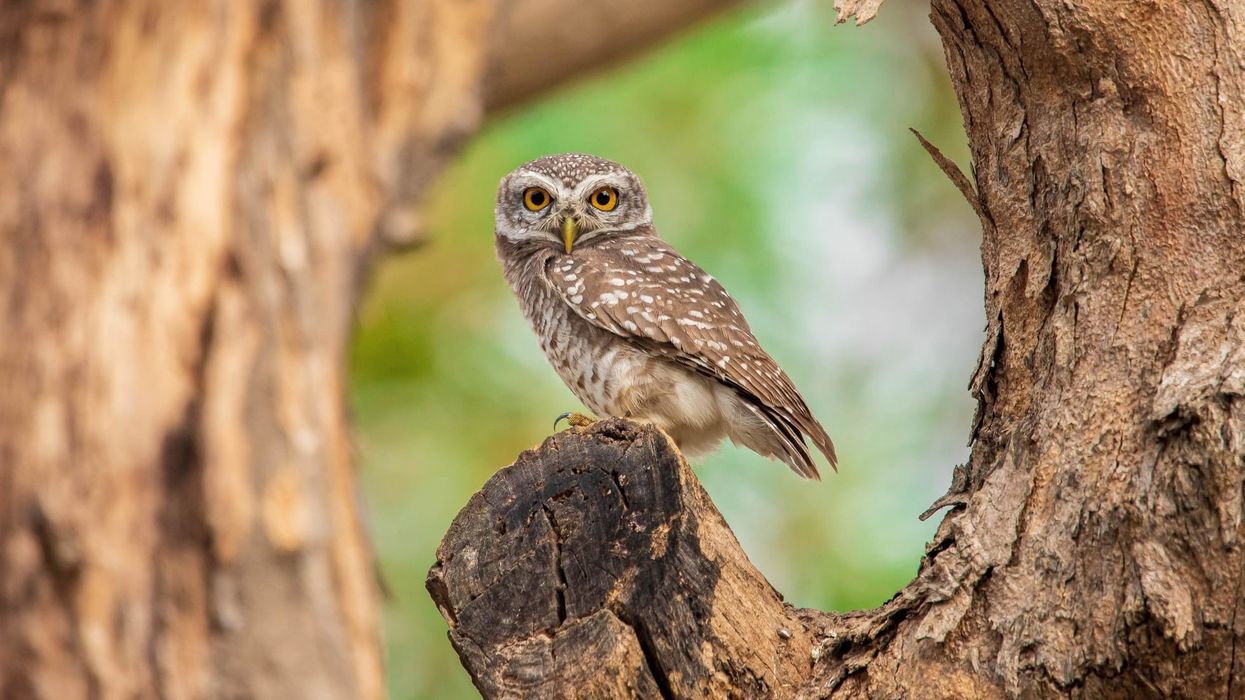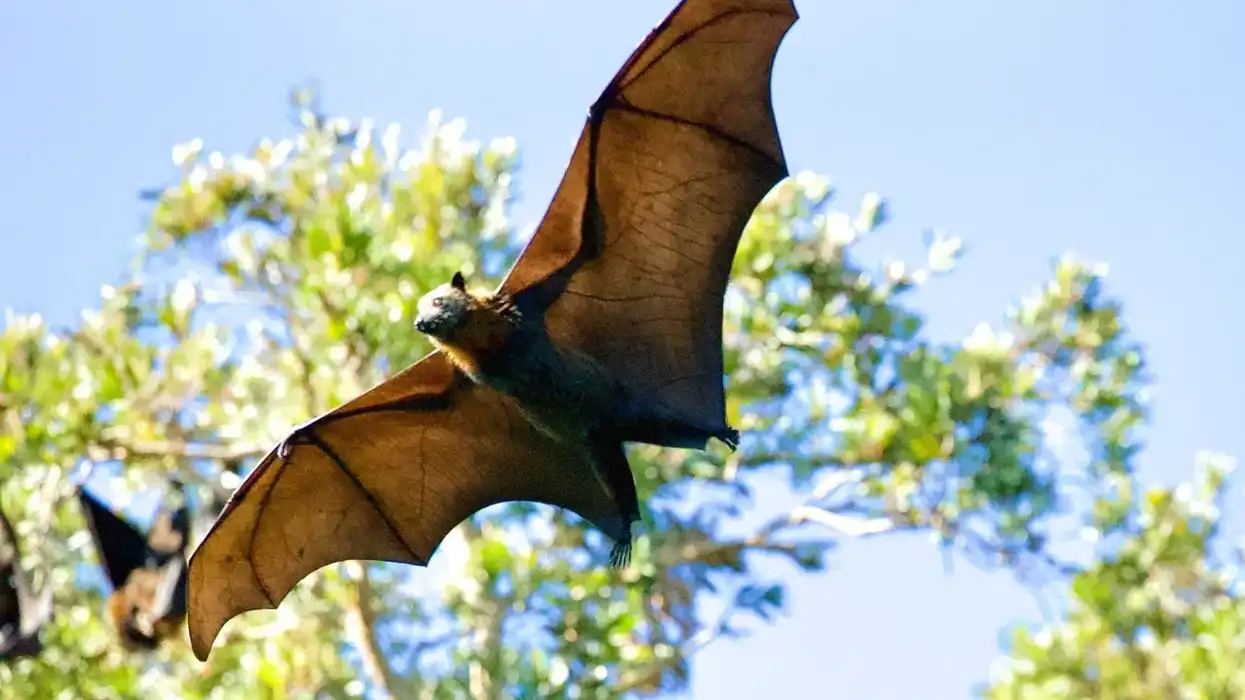The North American river otters are cute and adorable semi-aquatic animals primarily found in the U.S and Canada. Lontra canadensis is the North American river otter's scientific name, and it is one of the four otters present in the Lontra genus.
This species of river otters are known for their playful nature, where they can be seen sliding on mud or snow.
Interestingly, this is one of the otter species that can survive in various habitats, including places that are very cold or very warm. The sleek and shiny fur of these otters gives the animal an attractive look along with its precious whiskers.
Communication is key for these otters, and the scent glands near the base of its tail help to leave markings in its habitat. The female river otters have developed an impressive technique of pausing embryo implantations, which helps increase the mother's survival rate and its litter during the harsh winters.
These North American river otters have a stable population, but this small mammal was mainly hunted for fur in the past.
Want to know more about these otters? Keep reading to find out interesting North American river otter facts. Also, check out gundi facts and ferret facts!
North American River Otter Interesting Facts
What type of animal is a North American river otter?
The North American river otter (Lontra canadensis) is a small semi-aquatic mammal endemic to Northern America.
What class of animal does a North American river otter belong to?
The North American river otters belong to the class Mammalia and to the genus Lontra.
How many North American river otters are there in the world?
As an abundant animal, the river otter populations are yet to be fully documented.
Where does a North American river otter live?
The North American river otter range is mainly throughout the United States and Canada. However, populations are also seen in Mexico, especially in the delta made by the Rio Grande and Colorado Rivers. In the U.S, these river otters are absent in states like Texas, New Mexico, Nevada, Colorado, and California.
What is a North American river otter's habitat?
North American river otter's habitats are known for being diverse, and can even survive in cold areas. These river otters live in dens that can be situated in freshwater or brackish environments.
The common aquatic habitats for these animals include rivers, lakes, marshes, swamps, and estuaries. Otters will often choose places with an ample amount of fish or other food sources.
You will seldom find a river otter living in polluted areas. An interesting habit of these small mammals is to build dens in pre-existing burrows made by other animals.
Who do North American river otters live with?
North American river otters usually live alone except coming together during the mating season. However, these otters can also be social beings and may interact with others present near the habitat. Most groups contain female otters and pups.
These are playful animals, and you may find otters sliding on mud or on slope. Groups may also participate in mutual hunting and get better at placing scent mark through the scent glands. These otters also prefer to hunt at night.
How long does a North American river otter live?
The average North American river otter lifespan is around eight or nine years in the wild. However, in captivity, the river otters can live up to 21 years of age.
How do they reproduce?
One of the interesting North American river otter adaptations is present in the ability of the females to preserve the fertilized egg. These river otters usually mate during the winter or early spring months.
The females have the power to embryo diapause, where it literally pauses the process of carrying the embryo, and this process helps increase the probability of survival. The dormant embryos remain free-floating inside the female's uterus after mating takes place in the early spring.
During this period, the females use the time to eat as much as possible to increase their body fat percentage. A fun fact is that this unique characteristic is also found in armadillos.
After the harsh winter is over, embryo implantation takes place, and the babies are usually born in March or April after a gestation period of two months. Female otters usually give birth to one to six pups; however, the average is two to three pups per litter.
The pups are born with fur but have shut eyelids. Female otters will take care of their babies by feeding it milk and keeping it warm in the den formed close to water.
It takes about a month for the babies to open the eyes and another two months to get weaned.
The babies can take up to six months to move out from the natal territory, and it takes two to three years to reach sexual maturity. These river otters don't form monogamous relationships, so these animals don't mate for life.
What is their conservation status?
According to the International Union for Conservation of Nature (IUCN) Red List, the North American river otters are classified as Least Concern, and their population is stable. However, the number of otters is decreasing in some areas due to habitat loss.
Because of fur trapping, the population of river otters did decrease during the 19th century, but the North American river otter being endangered isn't a thing anymore as conservation efforts have caused the population to stabilize.
North American River Otter Fun Facts
What do North American River Otters look like?

North American river otters have a streamlined body as it belongs to the weasel family. The long body is complemented with an equally long and tapered tail that helps in navigating the aquatic habitat.
Otters also have a rounded head with small ears and a pointed nose with lots of whiskers. The top layer of fur is dark brown in river otters, with an underlying thick layer of fur that has a lighter tone.
Golden brown or yellow fur can be seen on the neck and cheeks of this species. The thick fur covering provides insulation to the otters.
These animals also have webbed feet that allow them to swim well, and claws are present on the feet. The males tend to have a larger body compared to the females.
How cute are they?
The weasel-like look and the cat-like whiskers of the river otters make these small animals look extremely cute and adorable.
How do they communicate?
The North American river otters have different forms of communication styles. When vocalizing, this species uses noises like whistles, growls, screams, and chuckles.
Scent forms an important part of the North American river otter behavior, and it is spread through the scent glands present under the tail. However, urine or fecal markings are also used by the river otters. The musk-like scent mark that is usually deposited by the river otters on its fecal matter is known as spraint.
Otters also have sensitive whiskers, which help in assessing the environment and also to pick up the spraints of other otters. Touching is another crucial communication cue for these otters.
How big is a North American river otter?
The average size of a North American river otter is around 35-51.1 in (88.9-129.7 cm). About 12-20 in (30-50 cm) can be dedicated to its long tail.
The male of this species tends to be larger than the females. Compared to river otters, sea otters have an average size of 39.6-49.3 in (100.5-125.2 cm), making both the animals similar in size.
How fast can a North American river otter run?
North American river otters aren't the best land runners as it is mainly meant to stay in aquatic environments. However, it can easily manage a speed of 15 mph (24 kph) when on land. The swimming speed of the river otter is around 5.6 mph (9 kph).
How much does a North American river otter weigh?
The average weight of the North American river otter is around 11-30.8 lb (5-14 kg).
What are the male and female names of the species?
There are no separate names for the males and females of this species.
What would you call a baby North American river otter?
A baby otter can be called a pup or a kitten.
What do they eat?
River otters are predominantly carnivorous, and it relies on aquatic food sources, including fish, turtles, amphibians, crayfish, and crabs. It can also feed on birds and their eggs.
Aquatic plants are also found in its diet, along with other aquatic roots and tubers. River otters are known for its prey-catching techniques. The prey is caught with the help of its mouth after it detects the prey by using its long whiskers.
Most of the prey is consumed in water, while larger animals might be eaten on land. Therefore, a habitat is chosen very carefully based on the amount of prey present in the surroundings.
Are they poisonous?
No, river otters aren't poisonous.
Would they make a good pet?
Not really! As a wild animal that lives in an aquatic habitat, it is always better to leave the animals alone in the wild. However, river otters are great zoo attractions and you can catch the animals in Potter park zoo or Oregon zoo.
Did you know...
River otters lack blubber; hence, these animals have to depend on their thick fur to keep warm during the winter months.
Apart from the North American river otters, the genus Lontra contains three other species, including the southern river otter, the neotropical otter, and the marine otter. Before being classified in the Lontra genus, this river otter was placed in the Lutra genus.
Otters have a third transparent eyelid that allows them to see underwater, and it also protects the eyes from getting damaged. While diving, the otters can also close their nostrils to keep water away from getting into their lungs.
The long whiskers of otters are known as vibrissae.
Otters have to take swimming lessons soon after their two-month birthdays!
How long can a river otter stay underwater?
The river otters have the capacity to stay up to eight minutes underwater. This is because of its larger lung capacity that is two and a half times that of similar-sized land mammals.
Do North American river otters mate for life?
No, the North American river otters do not mate for life. Most river otter males and females will come together only during the breeding season to give birth to the young otters.
Here at Kidadl, we have carefully created lots of interesting family-friendly animal facts for everyone to discover! Learn more about some other mammals from our quoll facts and red kangaroo facts pages.
You can even occupy yourself at home by coloring in one of our free printable North American river otter coloring pages.









